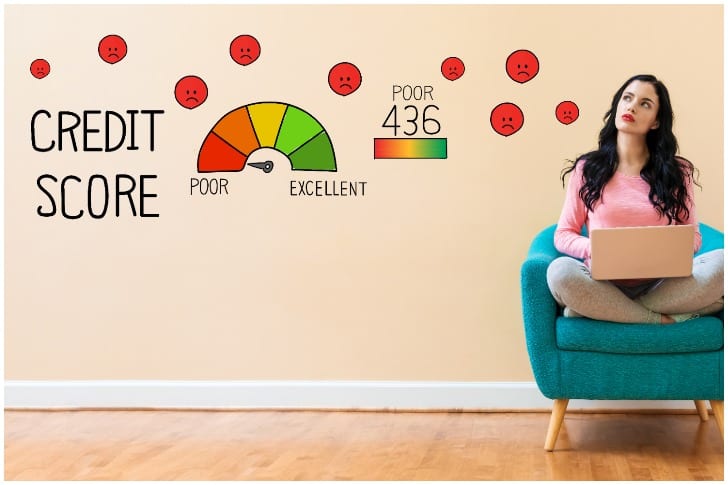
Personal-Finance Blunders That Will Endanger Your Company

There is a common misconception among new business owners that your personal finances are completely separate from your company finances. This is true to a certain extent, but many a time, the habits you cultivate with your finances translate into business practices.
Moreover, effective management of personal assets helps in making good decisions for your company, and you will never find yourself dipping into funds to catch up on private bills that you could have directed towards growing your business.
Below, you will find four critical blunders in personal finances that could seriously endanger your company.
A Poor Credit Score

TierneyMJ/Shutterstock: Poor credit score
Your credit score is essential in determining your eligibility in securing personal loans, credit cards, and even business loans. It can also influence the kinds of rates banks offer you.
A good credit rating reflects a responsible, money-smart business owner. A poor rating not only reflects negatively on you, but it could also disadvantage you in terms of funding for your business.
Many contributing factors influence your credit score and many models by which it can be calculated. Total credit usage, available credit, and balance are important factors worth monitoring.
High-Interest Debt

William Potter/Shutterstock: High-interest debt
Debts are almost inevitable for inexperienced business owners. However, high-interest debt is not a good look for potential investors. It makes you look unstable as a businessperson, and brings hesitation to investments, as you could potentially end up buried under exorbitant interest.
Credit card balances and payday loans are notorious for their high, accumulative interest rates. If you have debt in these areas, begin making a diligent effort to pay them off as quickly as possible. Due to the nature of these debts, the longer you take to repay them, the more it will cost you.
Lack of Emergency Fund

Alex Hinds/Shutterstock: Lack of Emergency Fund
The current Covid-19 situation worldwide has highlighted more than ever the need for business owners to be prepared for a rainy day.
Right from the beginning, set up and grow an emergency fund that can ideally cover up to 6 months in essential expenses. Make your calculations based on whether or not you have another provider in your household to supplement your income, and how much of your earnings you can save each month.
Do not tap into these savings until absolutely necessary. You can also consider different types of business insurances that cover a range of emergencies.
Failing to Separate Your Accounts
This is an easy mistake many entrepreneurs make, but it can be a costly one. Channeling customer payments into the same account, you dip into for personal expenditure can bring about all sorts of problems in terms of accountability.
It can make accounting extremely challenging, and if you are an employer—then also prevent you from maintaining transparency with your employees at the risk of compromising your privacy.
Instead, right from the get-go, invest in a separate account for your business. Transfer a portion of your monthly business earnings into your private account as a ‘salary.’ Not only will this help you with bookkeeping, but it will also be easy to gauge how your company is performing and growing.
When running a business, keeping the private and the professional separate is of paramount importance. However, when you are the face of your company, your personal financial habits can influence not only your reputation but also the approach you take towards managing your company. Hence, it is highly advisable for you to cultivate good habits with your money right from home.
More in Business
-
`
Investor David Einhorn Thinks Peloton Can Be Worth Five Times More IF It Cuts Costs
David Einhorn, founder and president of Greenlight Capital, has a bold vision for Peloton. He believes the struggling fitness company could...
November 7, 2024 -
`
How Interactive Matter Maps Improve Legal Research and Planning
Interactive matter maps have transformed legal research and planning by simplifying how law firms manage complex matters. These tools help legal...
November 1, 2024 -
`
The Role of Global Mobility in Business Planning for 2025
In an era where the competition for top talent is fierce, the significance of global mobility in business planning cannot be...
November 1, 2024 -
`
Will AI Legal Advice Empower or Exclude Those in Need of Justice?
The rapid advancement of technology has introduced AI legal advice into the legal profession, creating both excitement and concern. Law firms,...
October 25, 2024 -
`
Trump vs. Harris – Who Does Hollywood Support?
As the race for the White House heats up, celebrity endorsements have become an influential force in shaping public opinion during...
October 22, 2024 -
`
How to Understand Your Energy Bill and Prevent Common Billing Errors
Understanding your energy bill is essential for managing household expenses and catching potential errors. Your energy bill offers a breakdown of...
October 18, 2024 -
`
Is Shawn Mendes’ Relationship With Camila Cabello Finally Clarified?
Recently, Shawn Mendes shared insights into his connection with Camila Cabello during an interview with Jay Shetty. Their relationship, which has...
October 15, 2024 -
`
China Stimulus Fuels Market Surge, But Can It Save the Ailing Economy?
The recent China stimulus measures have sparked renewed optimism in the markets, but doubts remain about whether these efforts will be...
October 10, 2024 -
`
Top 12 Little-Known Savings Tips for Cutting Expenses Fast
Are you looking for the best ways to save money? Saving money often feels like a daunting task, but it doesn’t...
October 10, 2024















You must be logged in to post a comment Login